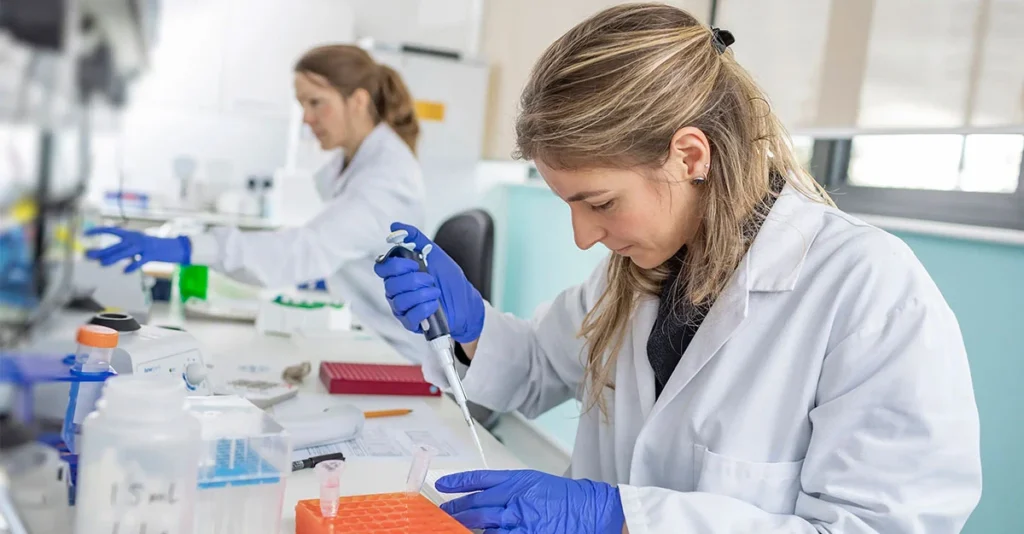Targeted therapies dramatically improve clinical outcomes and save lives—but only when genomic testing is performed first to identify the genomic drivers that underlie each patient’s tumor. The benefits of this precision medicine approach are particularly acute in non-small cell lung cancer (NSCLC), in which there are more than 25 FDA approved therapies that target genomic mutations. More than 50% of patients harbor these alterations and can benefit from targeted treatment.
“You want testing in all patients up front, because you want to match patients to the best possible therapy,” explains Joshua K. Sabari, MD, thoracic medical oncologist at NYU Langone Health’s Perlmutter Cancer Center in New York, in a recent roundtable discussion published in Targeted Oncology.
However, the most widely-used testing method of genomic testing – Next Generation Sequencing (NGS) – remains complex to implement and costly to run, suffers from high failure rates, and may take weeks to return results.
Because of this, and despite the huge potential for improved clinical outcomes with genomic testing and targeted therapy, “many patients with non-small cell lung cancer do not receive guideline-recommended, biomarker-directed therapy,” reports a recent paper in Histopathology. One reason is that genomic testing isn’t available to all patients. In one study, published in 2022 in JCO Precision Oncology, nearly half—49.7%—of 500,000 patients with advanced NSCLC failed to receive biomarker testing, which it called “a cornerstone of personalized medicine in cancer care.” Moreover, almost one third—29.2%—of those who do get biomarker testing still were not given the appropriate treatments, in part because of issues with the testing methods.

The failure to bring targeted therapies to the majority of NSCLC patients is a major problem in today’s healthcare system. Solving it requires fast access to critical biomarker data, in a format that overcomes the limitations of current approaches, and that can be implemented straightforwardly in labs across the nation. Thankfully, this is now possible.
Broad molecular profiling of tissue remains the gold standard in NSCLC, and the recommendation of standard of care guidelines. Until recently, the only solution for this has been NGS. However, despite being a powerful tool, NGS has serious limitations in clinical practice.
QC Failures
NGS test failure is a major challenge, with as many as 25% of samples failing NGS due to quality control (QC) issues. Moreover, all parts of tumors are not the same, so small samples may not capture the full genomic diversity of the tumor, thus missing key mutations that could guide therapy.
Not Enough DNA
For accurate and reliable results, NGS requires a sufficient amount of DNA, which may not be present in many biopsy samples. One study found that up to 30% of NSCLC samples are classified as “quantity not sufficient” (QNS).1 “This is a major barrier to getting testing done,” said Nathan Pennell, MD, PhD, Medical Oncologist and Co-Director of the Lung Cancer Program at Cleveland Clinic, in a recent Cancer Advances podcast. This problem, ironically, has been worsened by advances in robotic surgery which are resulting in more samples being collected as fine needle aspirates (FNAs). These samples are typically much smaller than standard core needle biopsies, and are much more challenging to analyze. “In too many cases, pathologists like myself have to deliver the bad news to oncologists that the biopsy samples they sent us don’t contain enough genomic material for reliable sequencing,” says molecular pathologist and Consultant Lab Director Dr. Shari Brown.
Long Turnaround Times
Even with high-quality samples, NGS takes time, with an average turnaround of 21 days. This is a serious problem when most lung cancer patients are diagnosed at Stage III or Stage IV and need to start treatment as quickly as possible. This problem gets worse when the initial biopsy sample is insufficient or of poor quality, requiring a repeat procedure that can be painful and challenging, particularly in patients with advanced disease or those in poor condition.
High Costs
NGS is costly, both in terms of the price—an average of $3,000 to $5,000 per sample—and the emotional toll on patients as they are forced to wait weeks before they can begin treatment.

Now, however, there is a biomarker testing approach that solves all of these challenges. Called Aspyre Clinical Test for Lung, it accurately and rapidly analyzes all NCCN guideline recommended genes for NSCLC. It generates results in just two days, at a small fraction of the cost of NGS, enabling patients to get the right treatment for their individual tumors within days of diagnosis, not weeks.
Equally important, research shows that Aspyre Clinical Test for Lung solves quantity and quality issues. In one recent study, Biofidelity scientists reexamined commercially biobanked specimens from NSCLC patients that had failed quality control (QC) for NGS. The results of this study were accepted as a late breaking poster presentation at the AACR Annual Meeting 2024 in San Diego, California, and will be published in the online Proceedings of the AACR.
Aspyre Clinical Test for Lung is transformative for patients, enabling the rapid and accurate identification of actionable genomic mutations and fast, confident treatment decisions. It can be used both as a cost-effective first-line testing option, instead of NGS, or as a salvage method for testing samples that failed NGS because of insufficient DNA quantities or quality control issues. Aspyre Clinical Test for Lung thus has the potential to enable all patients to benefit from today’s highly effective targeted therapies.
1. Clinical Next-Generation Sequencing in Patients with Non-Small Cell Lung Cancer, Ian S. Hagemann, et.al, Original Article, Cancer, February 15, 2015. https://doi.org/10.1002/cncr.29089
Connect with us
Have questions, need more information, or ready to start your journey? Connect with us below.